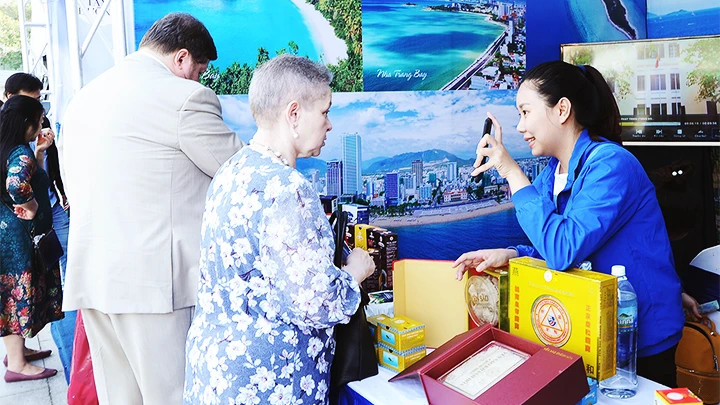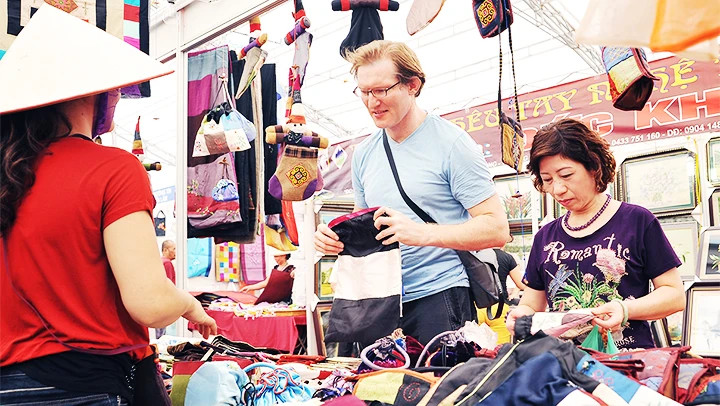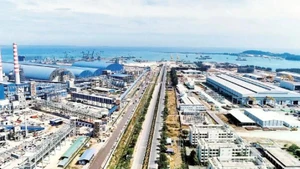At the end of last year, a batch of processed and frozen Ca Mau crabs and spotted babylon snails from the Vua Cua (King Crab) startup company, was successfully exported to the US market.
The order included approximately 21,000 Ca Mau crabs, equivalent to 11 tonnes, to be sold at 200 locations in American markets and supermarkets. In the US, each 500-gram crab sauce box (containing both crab roe and meat) was priced at 25 – 27 USD, equivalent to 600,000 - 650,000 VND, and each spotted babylon snail sauce box was priced between 19 – 22 USD, equivalent to 456,000 - 528,000 VND, depending on the state.
Vua Cua Company’s Executive Director Doan Thi Anh Thu stated that after the first order, the company has continued to develop processed products from various Vietnamese seafood, such as tiger prawns, crabs, squid, lobsters, and crab-based dishes, such as crab stir-fried noodles, fried rice with crab, and sticky rice with crab, to serve different customer segments.
"As a startup, we boldly exported Ca Mau crabs through official channels with deep processing and branding under Vua Cua, rather than raw export or processing for partners. Not only for revenues, profit, and fame, we also hope to succeed in bringing Ca Mau crabs, Vietnamese seafood and spices to the world’s dining tables”, added Anh Thu.
The company's ambition is well-founded as products that are difficult to preserve, like crabs, have made a round-the-world journey to conquer one of the most demanding markets like the US.
According to the Vietnam Association of Seafood Exporters and Producers (VASEP), amid the challenging seafood export environment, some companies have studied the development of many value-added products, and products combining seafood with convenient vegetables for consumers. These products have higher profit margins and do not compete on price like raw material exports. Additionally, the businesses can build their brands in foreign markets.
Talking about the dynamic capabilities of Vietnamese businesses, Luong Minh Huan, Director of the Institute for Enterprise Development, noted that Vietnamese companies have actively participated in the global value chain, with 62.1% of Vietnam’s total export value involved in global value chains, 51.1% of Vietnam’s global value chain involvement coming from consuming external products, and 11% coming from supplying products externally.
However, many businesses lack clear strategies to participate in the global value chain. According to a survey, 64.7% of companies have not prepared for participation in the global value chain, only 15.3% have a long-term strategy or plan, and 10.2% have medium-term action plans. Modestly, 5.4% of enterprises have set short-term tasks and action plans, and only 4.4% have implemented specific actions.
"Vietnamese businesses focus on solving aspects considered the 'tip of the iceberg' of problem. Their ability to meet partners’ requirements in the global value chain is average, and they face more difficulties meeting delivery time and technical standards," said Luong Minh Huan.
Tran Thi Lan Anh, General Secretary of the Vietnam Chamber of Commerce and Industry (VCCI), expressed concern that 64.7% of businesses wanting to join the supply chain lack specific strategies. "The 500 businesses surveyed in the report are relatively strong, but their dynamic capabilities are average. Innovation ability is crucial to achieving a position in the global supply chain, yet many businesses are very weak in this regard. This is a significant issue that needs to be addressed”.
 |
| Khanh Hoa bird’s nest products are showcased at a trade promotion fair. (Photo: NGUYET ANH) |
Supporting businesses in entering the global market
Assessing the limitations in enhancing the value within the global supply chain for Vietnamese businesses, Dr Le Duy Binh, an economic expert, suggested that the businesses’ efforts play a crucial role in finding products that align with market preferences and overcoming technical barriers and stringent regulations in various markets. However, support in terms of institutional conditions, policies, a transparent and safe business environment, and encouragement for investment in technology, innovation, research, and development, is essential for businesses to access global supply chains more comprehensively.
“Businesses cannot enter the global market without a solid and reliable foundation at home. This includes a mechanism that encourages, supports, and provides businesses with opportunities from relevant agencies, ministries, and localities”, said Dr. Le Duy Binh.
Nguyen Van Hoi, Head of the Institute for Strategic and Policy Studies on Industry and Trade under the Ministry of Industry and Trade, stated that there is a need to refine policies to support businesses in deeper and higher-value integration, into the global supply chain.
First, it is necessary to organise fairs, trade promotion and investment events, market development activities and diversify promotional and product introduction methods. Second, building and developing brands is essential. Raising awareness among businesses about labour and environmental issues in free trade agreements is also crucial. Third, attention should be paid to issues, related to origin rules and trade defences. Businesses should also diversify their export markets. Fourth, it is important to establish technical barriers, such as applying import technical standards, anti-dumping lawsuits, and environmental taxes to protect domestic production.
Emphasising solutions to enhance businesses' adaptability and market development, the VCCI Secretary General proposed that ministries and agencies should promote e-commerce, especially cross-border e-commerce, to boost the development of supply chains, facilitate goods circulation, expand markets, and enhance exports.
















